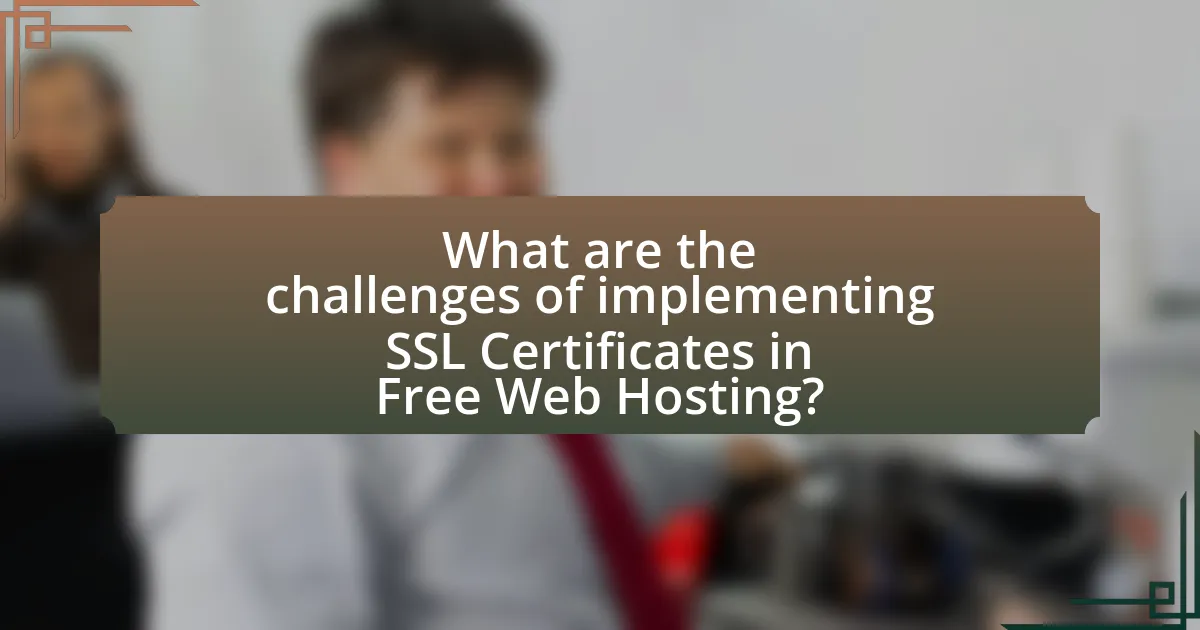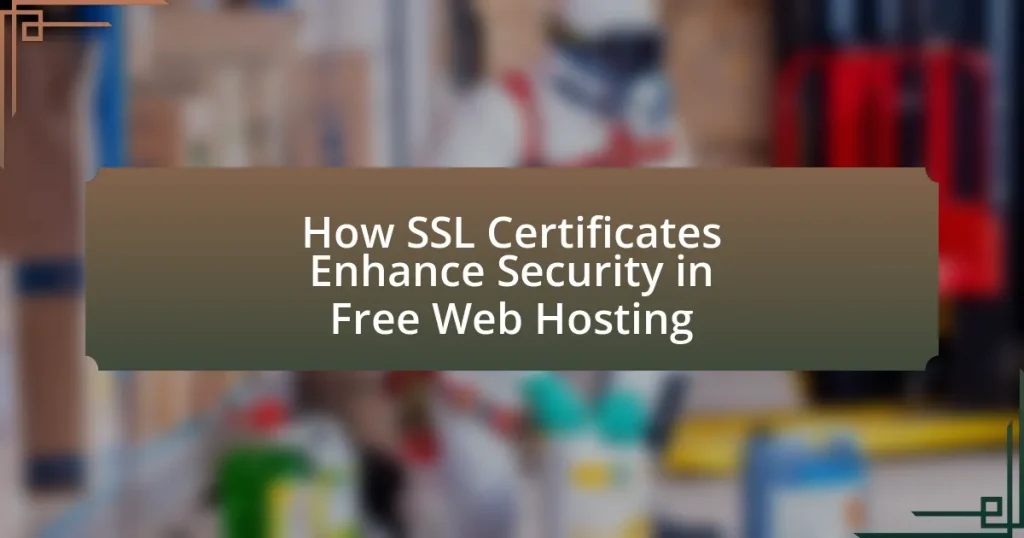SSL certificates are essential digital tools that authenticate website identities and encrypt data transmitted between users and servers, significantly enhancing security in free web hosting environments. This article explores the importance of SSL certificates, detailing how they work, their key components, and the SSL handshake process that fortifies online security. It also addresses the security risks associated with free web hosting, the types of attacks SSL certificates can prevent, and their impact on search engine rankings and user trust. Furthermore, the article discusses the challenges of implementing SSL in free hosting, common misconceptions, and best practices for managing SSL certificates effectively. Lastly, it highlights future trends and innovations in SSL technology that could further enhance security measures in free web hosting.

What are SSL Certificates and Why are They Important for Free Web Hosting?
SSL certificates are digital certificates that authenticate the identity of a website and encrypt information sent to the server using Secure Sockets Layer (SSL) technology. They are crucial for free web hosting because they ensure secure data transmission, protecting sensitive information such as login credentials and payment details from interception by malicious actors. According to a 2021 report by Google, websites with SSL certificates are favored in search engine rankings, enhancing visibility and trustworthiness. Additionally, many web browsers flag non-SSL sites as “not secure,” which can deter users from engaging with a website, making SSL certificates essential for maintaining user confidence and security in free web hosting environments.
How do SSL Certificates work in the context of web hosting?
SSL certificates work by establishing an encrypted connection between a web server and a browser, ensuring that data transmitted remains secure. When a user accesses a website with an SSL certificate, the server sends the certificate to the browser, which verifies its authenticity through a trusted Certificate Authority (CA). Once verified, the browser and server create a secure session using encryption protocols like TLS (Transport Layer Security). This process protects sensitive information, such as login credentials and payment details, from interception by malicious actors. The presence of SSL certificates is crucial in web hosting, as it not only secures data but also boosts user trust and improves search engine rankings, with Google prioritizing HTTPS sites in its algorithms.
What are the key components of an SSL Certificate?
The key components of an SSL Certificate include the public key, the certificate authority (CA) signature, the subject name, the validity period, and the certificate serial number. The public key is used for encrypting data, while the CA signature verifies the authenticity of the certificate. The subject name identifies the entity that owns the certificate, and the validity period specifies the timeframe during which the certificate is considered valid. The serial number uniquely identifies the certificate issued by the CA. These components work together to establish a secure connection and ensure data integrity and confidentiality in online communications.
How does the SSL handshake process enhance security?
The SSL handshake process enhances security by establishing a secure connection between a client and a server through mutual authentication and encryption. During this process, the client and server exchange cryptographic keys and verify each other’s identities, ensuring that data transmitted between them is encrypted and protected from eavesdropping or tampering. The use of protocols like TLS (Transport Layer Security) during the handshake further strengthens this security by employing advanced encryption algorithms, which are designed to prevent unauthorized access to sensitive information. This process is critical in free web hosting environments, where the risk of data breaches is heightened, as it helps to safeguard user data and maintain trust in online transactions.
What security risks are associated with free web hosting?
Free web hosting presents several security risks, including data breaches, lack of SSL encryption, and limited customer support. Data breaches can occur due to inadequate security measures, exposing sensitive information. Many free hosting services do not provide SSL certificates, which are essential for encrypting data transmitted between users and websites, making it easier for attackers to intercept information. Additionally, the lack of reliable customer support can hinder timely responses to security incidents, leaving websites vulnerable for extended periods. According to a study by the Ponemon Institute, 60% of small businesses that experience a data breach go out of business within six months, highlighting the critical nature of these risks.
How can free web hosting expose websites to vulnerabilities?
Free web hosting can expose websites to vulnerabilities due to inadequate security measures and lack of support. Many free hosting services do not implement essential security protocols, such as SSL certificates, which encrypt data transmitted between the user and the website, leaving sensitive information susceptible to interception. Additionally, free hosting often shares server resources among multiple users, increasing the risk of cross-site scripting (XSS) and other attacks. According to a study by the University of California, Berkeley, shared hosting environments can lead to a 50% higher likelihood of security breaches compared to dedicated hosting solutions. Furthermore, free hosting providers may not offer regular updates or patches, leaving websites vulnerable to known exploits.
What types of attacks can SSL Certificates help prevent?
SSL Certificates help prevent various types of attacks, including man-in-the-middle attacks, eavesdropping, and data tampering. By encrypting the data transmitted between a user’s browser and the web server, SSL Certificates ensure that sensitive information, such as login credentials and payment details, cannot be intercepted or altered by malicious actors. According to a study by the Ponemon Institute, 70% of organizations experienced a data breach due to unencrypted data transmission, highlighting the critical role of SSL Certificates in safeguarding online communications.

How do SSL Certificates Enhance Security in Free Web Hosting?
SSL certificates enhance security in free web hosting by encrypting data transmitted between users and the web server. This encryption protects sensitive information, such as login credentials and personal data, from interception by malicious actors. According to a study by Google, HTTPS (enabled by SSL certificates) can reduce the risk of man-in-the-middle attacks, which are common in unsecured connections. Additionally, SSL certificates help build user trust, as browsers display visual indicators, such as a padlock icon, signaling that the connection is secure. This trust is crucial for free web hosting services, where users may be more skeptical about data safety.
What are the primary benefits of using SSL Certificates for free web hosting?
The primary benefits of using SSL Certificates for free web hosting include enhanced security, improved trustworthiness, and better search engine rankings. SSL Certificates encrypt data transmitted between the user’s browser and the web server, protecting sensitive information from interception, which is crucial for maintaining user privacy and security. Additionally, websites with SSL Certificates display a padlock icon, signaling to users that their connection is secure, thereby increasing trust and potentially boosting conversion rates. Furthermore, search engines like Google prioritize secure websites in their rankings, meaning that implementing SSL can lead to increased visibility and traffic for free web hosting sites.
How does SSL encryption protect user data?
SSL encryption protects user data by establishing a secure, encrypted connection between the user’s browser and the web server. This encryption ensures that any data transmitted, such as personal information or payment details, is converted into a format that is unreadable to unauthorized parties. SSL uses protocols like TLS (Transport Layer Security) to encrypt the data, making it nearly impossible for hackers to intercept or decipher the information during transmission. According to a study by the University of Michigan, SSL encryption significantly reduces the risk of data breaches, demonstrating its effectiveness in safeguarding sensitive information online.
What role does SSL play in building user trust?
SSL plays a crucial role in building user trust by encrypting data transmitted between users and websites, ensuring that sensitive information remains secure. This encryption protects against eavesdropping and data breaches, which are significant concerns for users when sharing personal information online. According to a 2021 survey by the Cybersecurity & Infrastructure Security Agency, 85% of users are more likely to trust a website that uses SSL, as it signals a commitment to security. Additionally, the presence of SSL certificates is often indicated by a padlock icon in the browser, further reassuring users about the safety of their interactions with the site.
How do SSL Certificates impact SEO and website performance?
SSL certificates positively impact SEO and website performance by enhancing security and building user trust. Search engines like Google prioritize secure websites, which can lead to improved rankings in search results. A study by Google indicated that HTTPS websites receive a ranking boost compared to their HTTP counterparts. Additionally, SSL certificates improve website performance through features like HTTP/2, which allows for faster loading times and better resource management. Faster websites contribute to lower bounce rates and higher user engagement, further benefiting SEO.
What is the relationship between SSL Certificates and search engine rankings?
SSL certificates positively impact search engine rankings by signaling to search engines that a website is secure. Google has confirmed that HTTPS, which is enabled by SSL certificates, is a ranking factor in its algorithm. Websites with SSL certificates are prioritized in search results over those without, as they provide a safer browsing experience for users. This prioritization is supported by data indicating that secure sites tend to have lower bounce rates and higher user engagement, further enhancing their visibility in search results.
How can SSL Certificates improve website loading times?
SSL certificates can improve website loading times by enabling HTTP/2, which allows for multiplexing, header compression, and prioritization of requests. These features reduce latency and enhance the speed at which web pages load. According to a study by Google, websites using HTTP/2 can experience up to 50% faster loading times compared to those using HTTP/1.1. Additionally, SSL certificates can enhance caching mechanisms, allowing browsers to store and retrieve resources more efficiently, further contributing to improved loading speeds.

What are the challenges of implementing SSL Certificates in Free Web Hosting?
Implementing SSL Certificates in free web hosting presents several challenges, primarily due to limited resources and support. Free web hosting services often lack the infrastructure necessary to manage SSL certificates effectively, which can lead to issues such as inadequate server configurations and lack of automatic renewals. Additionally, many free hosting providers do not offer the option to install custom SSL certificates, forcing users to rely on shared certificates that may not provide the same level of security or trust. Furthermore, the absence of technical support can complicate the troubleshooting process when SSL-related issues arise, leaving users vulnerable to security risks.
What limitations do free web hosting services impose on SSL Certificates?
Free web hosting services typically impose several limitations on SSL Certificates, including restricted access to certain types of SSL, lack of support for custom SSL installations, and potential issues with certificate validation. Many free hosting providers only offer basic SSL options, such as shared SSL, which does not provide the same level of security and trust as dedicated SSL certificates. Additionally, users may not have the ability to install their own SSL certificates, limiting their control over security configurations. Furthermore, some free services may not support the necessary validation processes for obtaining higher-level SSL certificates, which can compromise the overall security of the hosted website.
How can users overcome these limitations?
Users can overcome the limitations of free web hosting by implementing SSL certificates to secure their websites. SSL certificates encrypt data transmitted between the user’s browser and the server, enhancing security and building trust with visitors. According to a study by Google, websites with SSL certificates are favored in search rankings, which can lead to increased traffic and user engagement. Additionally, users can opt for reputable free hosting providers that offer built-in SSL support, ensuring that their sites are protected without incurring extra costs.
What are the common misconceptions about SSL Certificates in free hosting?
Common misconceptions about SSL certificates in free hosting include the belief that free SSL certificates are less secure than paid ones, that all free hosting providers offer SSL by default, and that SSL certificates are unnecessary for small websites. In reality, many free hosting services provide valid SSL certificates that offer strong encryption, such as those issued by Let’s Encrypt, which is widely recognized for its security. Additionally, while not all free hosting providers automatically include SSL, many do, and it is essential for any website, regardless of size, to implement SSL to protect user data and enhance trust.
What steps should be taken to secure a free web hosting site with SSL?
To secure a free web hosting site with SSL, first, obtain an SSL certificate from a trusted certificate authority or a free provider like Let’s Encrypt. This certificate encrypts data transmitted between the server and users, ensuring confidentiality and integrity. Next, install the SSL certificate on your web hosting server, which typically involves accessing the hosting control panel and following the installation instructions provided by the hosting service. After installation, configure your website to use HTTPS instead of HTTP, which can often be done by updating the site settings or using a plugin if applicable. Finally, test the SSL implementation using online tools like SSL Labs to ensure that the certificate is correctly installed and that there are no vulnerabilities. These steps collectively enhance the security of a free web hosting site by protecting user data and improving trustworthiness.
How can users choose the right SSL Certificate for their needs?
Users can choose the right SSL Certificate by assessing their specific security needs, website type, and budget. For instance, organizations requiring high assurance should opt for Extended Validation (EV) Certificates, which provide the highest level of trust and are ideal for e-commerce sites. Conversely, smaller websites or personal blogs may find Domain Validation (DV) Certificates sufficient, as they offer basic encryption at a lower cost. Additionally, users should consider the certificate’s compatibility with their hosting provider and the level of customer support offered. According to a 2021 survey by the Internet Security Research Group, 80% of users prefer websites with SSL Certificates, highlighting the importance of selecting the appropriate type for enhancing security and user trust.
What are the best practices for managing SSL Certificates on free hosting platforms?
The best practices for managing SSL certificates on free hosting platforms include regularly monitoring certificate expiration dates, using automated renewal processes, and ensuring proper installation and configuration. Regular monitoring helps prevent service disruptions due to expired certificates, as SSL certificates typically have a validity period ranging from 90 days to two years. Automated renewal processes, such as those offered by Let’s Encrypt, simplify management by automatically renewing certificates before they expire. Proper installation and configuration ensure that the SSL certificate is correctly applied to the domain, which is crucial for establishing secure connections. Following these practices enhances security and maintains trust with users accessing the website.
What are the future trends regarding SSL Certificates in free web hosting?
Future trends regarding SSL certificates in free web hosting indicate an increasing adoption of automated certificate issuance and management, primarily driven by initiatives like Let’s Encrypt. This trend is supported by the growing emphasis on website security and the necessity for HTTPS as a standard practice, with studies showing that over 80% of websites now use SSL certificates. Additionally, free web hosting providers are likely to integrate SSL certificates as a default feature to enhance user trust and comply with search engine ranking algorithms that favor secure sites. As a result, the landscape of free web hosting will increasingly prioritize security, making SSL certificates more accessible and essential for all users.
How is the adoption of SSL Certificates expected to evolve?
The adoption of SSL Certificates is expected to increase significantly in the coming years, driven by growing concerns over online security and privacy. As cyber threats become more sophisticated, businesses and individuals are recognizing the importance of encrypting data transmitted over the internet. According to a report by Global Market Insights, the SSL certificate market is projected to exceed $3 billion by 2026, reflecting a compound annual growth rate of over 15%. This trend is further supported by initiatives from major web browsers, which are increasingly flagging non-secure sites, thereby incentivizing website owners to implement SSL Certificates to maintain user trust and comply with security standards.
What innovations in SSL technology could enhance security further?
Innovations in SSL technology that could enhance security further include the implementation of Certificate Transparency, which allows for the public logging of SSL certificates to prevent misissuance and increase accountability. Additionally, the adoption of Quantum Key Distribution (QKD) could provide a method for secure key exchange that is theoretically immune to eavesdropping, addressing potential vulnerabilities posed by quantum computing. Furthermore, the integration of automated certificate management solutions can reduce human error in certificate issuance and renewal processes, thereby minimizing the risk of expired or misconfigured certificates. These advancements collectively strengthen the integrity and trustworthiness of SSL communications, particularly in the context of free web hosting, where security is paramount.
What practical tips can help users maximize SSL Certificate benefits in free web hosting?
To maximize SSL Certificate benefits in free web hosting, users should ensure that their SSL certificate is properly installed and configured on their web server. Proper installation guarantees that data transmitted between the user’s browser and the server is encrypted, which is essential for protecting sensitive information. Additionally, users should regularly check for updates and renew their SSL certificates to maintain security standards, as expired certificates can lead to vulnerabilities. Utilizing tools like SSL checkers can help verify the certificate’s validity and configuration. Furthermore, users should promote the use of HTTPS on their websites, as this not only enhances security but also improves search engine rankings, given that Google prioritizes secure sites.
